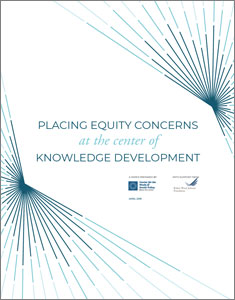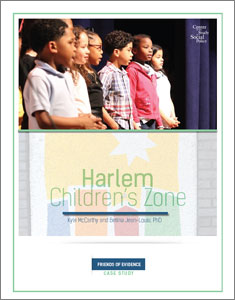In this report, we turn our attention to considering what it means to “place equity concerns at the center” of improving outcomes for those who are the most marginalized.
(21 pp)
OR
OR
In this report, we turn our attention to considering what it means to “place equity concerns at the center” of improving outcomes for those who are the most marginalized.
(21 pp)

This brief looks at how HCZ uses and generates evidence to achieve its goals. Its analysis is organized around five characteristics found in initiatives considered “evidence innovators.”
(8 pp)

This brief compiles case studies from various initiatives and makes the concept of a “culture of evidence” accessible with illustrations of an approach to improve equitable outcomes for families and communities.
(5 pp)
This brief explores how the initiative uses and generates evidence in order to achieve its goals and how it came to choose the "Success Coach" model.
(7 pp)
This report investigates Pathways through the lens of how it uses and generates evidence to achieve its goal of building a substantial infrastructure to support and embed quality improvement.
(9 pp)
This report explains why decision-makers need better support and to be truly "evidence-informed," as well as specific recommendations about how to move forward.
(15 pp)
This brief explains the need for "a broader range of evidence" for decision-makers, examples of what that looks like, and recommendations on policy and policy implementation.
(12 pp)
This brief details the AIC's powerful approaches to evidence and their efforts to improve outcomes among disadvantaged children, families, youth, and neighborhoods.
(7 pp)
This report explores the question of how we use a framework of continuous learning to obtain and apply the kinds of evidence that will be most useful in achieving significantly greater outcomes.
(48 pp)
This report provides recommendations related to expanding the knowledge base necessary to improve outcomes for children, families, and communities and was written for discussion at the Harold Richman Public Policy Symposium, the first in a series of forums honoring the memory of Harold Richman, co-founder of CSSP.
(60 pp)